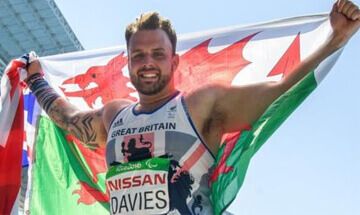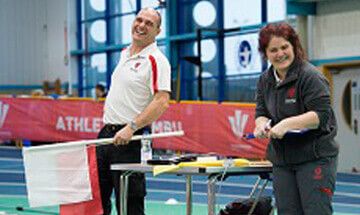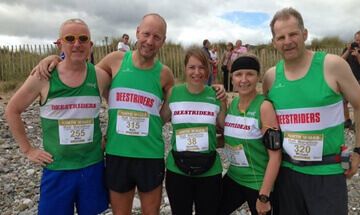
Dai Greene
Dai Greene
Dai Greene (pictured on the left) is one of the all-time greats of Welsh athletics and one of only two Welsh athletes to win a World Athletics title in the traditional track and field events, joining double champion and former 110m hurdles world record holder Colin Jackson.
The Llanelli-born superstar established himself as one of the greatest Britons over 400m hurdles by being the European and Commonwealth champion at the same time as he was World Champion.
He joins a select quartet of Welshmen who have been Britain’s number one 400m hurdler, starting with 1954 Commonwealth bronze medallist, Bob Shaw; 1992 Commonwealth silver medallist Matt Elias and multi European medallist Rhys Williams. But his triumphs were far superior to these highly respected athletes.
But a British record eluded him as his best of 47.84 secs set in 2012, just before the London Olympics, was just two hundredths of a second behind the time Kriss Akabusi clocked when winning the 1992 Olympic bronze medal in Barcelona.
Appointed Britain’s team captain, he went into the 2012 London Olympics as the second fastest in the world behind Javier Culson of Puerto Rico and feeling confident that he could complete the full set and be the first to hold all four global major gold medals at the same time.
But after a poor fourth place in his semi-final, he finished just out of the medals with 48.24 secs, his fourth fastest of the season and slower than his semi time. The gold surprisingly went to Felix Sanchez of The Dominican Republic in 47.63 secs with Culson, the man that Dai had regularly beaten in the past, taking the bronze, just .14 of a second ahead of Dai.
Ironically, Dai also finished 4th as part of Great Britain’s 4 x 400 team running a scintillating leg of 45.53, which was his fastest flat 400 behind his best in a straight-out 400 flat of 45.82 set when finished third in the UK championships of 2011. The British team missed bronze by just 13 hundredths of a second.
Afterwards, he said that he was bitterly disappointed with his hurdles run. He said: “I felt that there was a good chance of a medal, perhaps even gold, but I felt very fatigued, and my semi-final run took it out of me.”
There’s no doubt, that despite his personal best 47.84 in the month before the Games, and having missed a large part of his winter’s training, his knee injury took its toll.
He first became recognised on the international stage when he took the European junior silver medal in 2005 in Lithuania in a personal best of 51.14 secs. However, his first international title came two years later when he won the European under 23 title in Debrecen in a personal best of 49.58 and this started a period of 7 years where he was Britain’s number one 400 hurdler each year except in 2008, when he was second best to fellow Malcolm Arnold coached Richard Yates, having joined former Welsh National Coach Arnold’s group in Bath in 2009. But he acknowledges that he owes much to his first coach, 4 times Welsh 800m champion, Darrell Maynard.
His world championships win came in Daegu in 2011 when he took the title from Culson in 48.26 to become the first Briton to win a global 400m hurdles gold since David Hemery’s world record win in the 1968 Mexico Olympics. In his first World Championships appearance in Berlin in 2009, he finished 7th after running a fine personal best in his semi-final of 48.23.
2010 and 2011 were undoubtedly his best years. Firstly, in the 2010 Barcelona European Championships he led a Welsh one-two in the 400 hurdles winning in 48.12 ahead of Rhys Williams who was to take the title in Dai’s absence two years later.
He wore the red vest of Wales in just two Commonwealth Games and in Delhi two months after his European win he triumphed in 48.52 with Rhys Williams again making it a one-two for Wales. Whilst not at his best due to his persistent knee injury in the 2014 Games in Glasgow, he finished 6th.
These two performances are the only occasions when two Welsh athletes have occupied the two top spots in a major athletics championship.
He brought his 2010 season to a close in September when representing Europe in the Continental Cup in Yugoslavia, winning in 47.88 in his fastest time of the season, again ahead of Culson.
Dai took up athletics relatively late in life after being a promising footballer, but showed a glimpse of his hurdling potential taking the Welsh U13 75m hurdles title. His Welsh titles were few taking his speciality just once in 2006 with a championships best of 50.66 and the 400 flat in 2010 with 46.38. He also took 400 hurdles and flat 400 under 20 titles in 2005 with 55.03 and 48.53 respectively. In 2005, in his last year in school, he took the took the British Schools title with 54.1.
Dai is Welsh athletics royalty and along with a select band of others can quite rightly claim to be one of the finest sportsmen produced by Wales.
After retiring in July 2024 he was swiftly inducted into our Hall of Fame three months later.
Written by Clive Williams
Dolenni diddorol
Tudalennau yn yr adran hon a allai fod o ddiddordeb.


